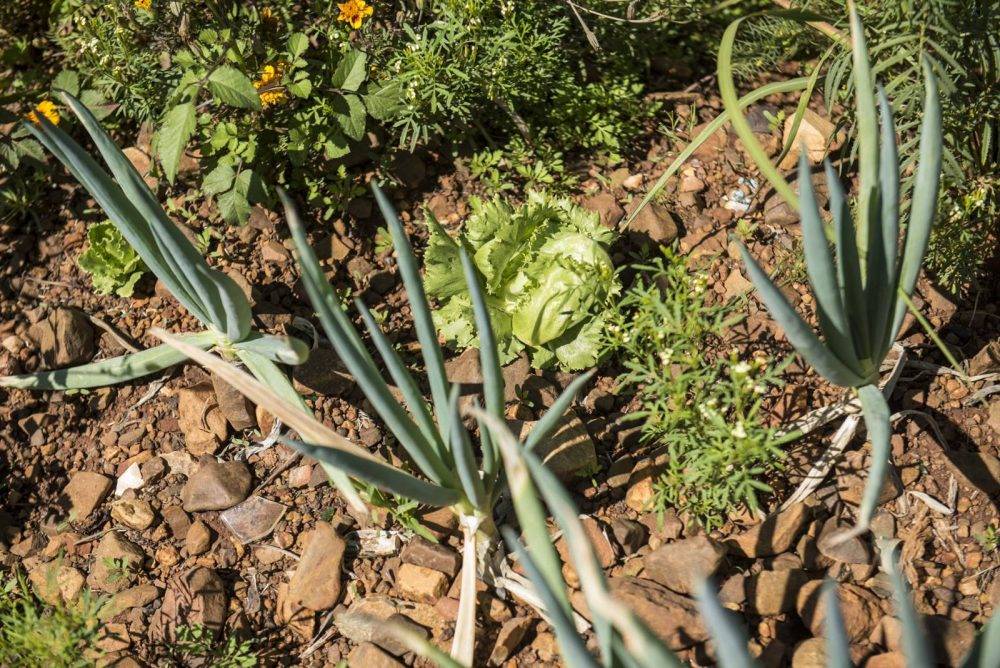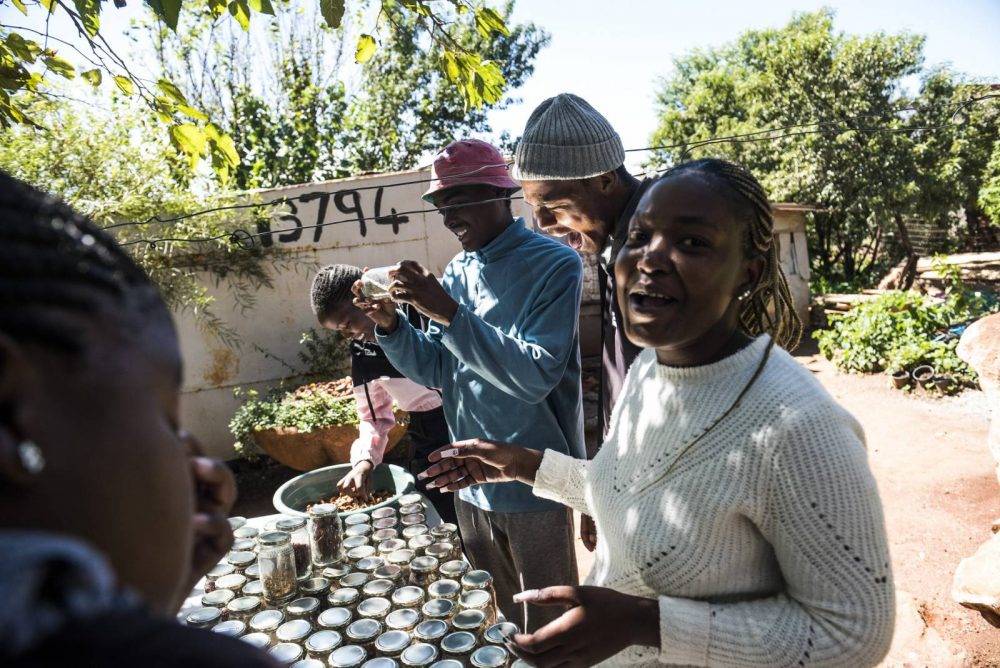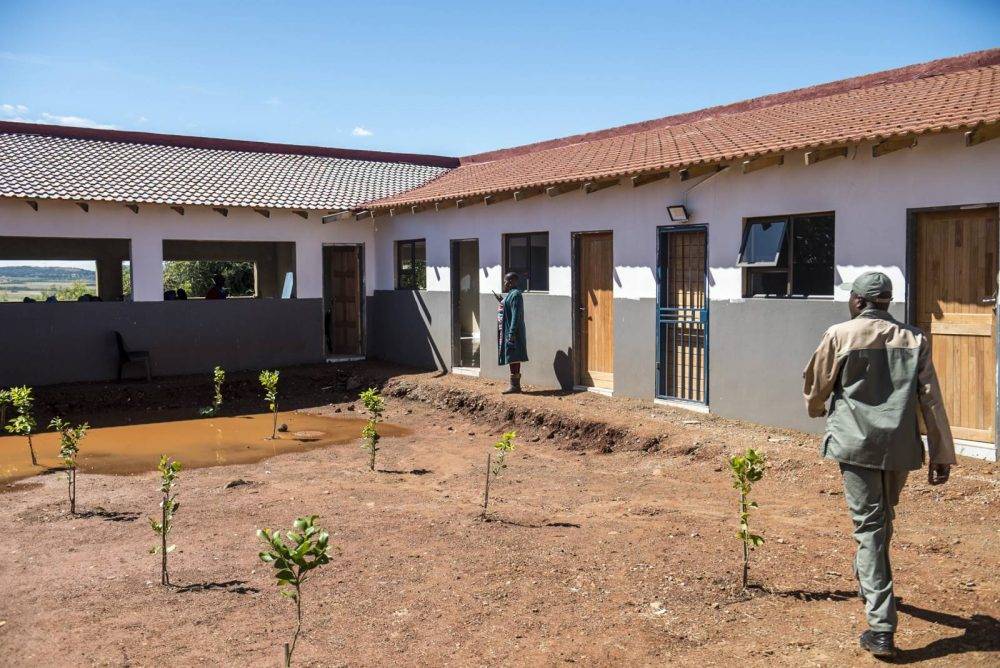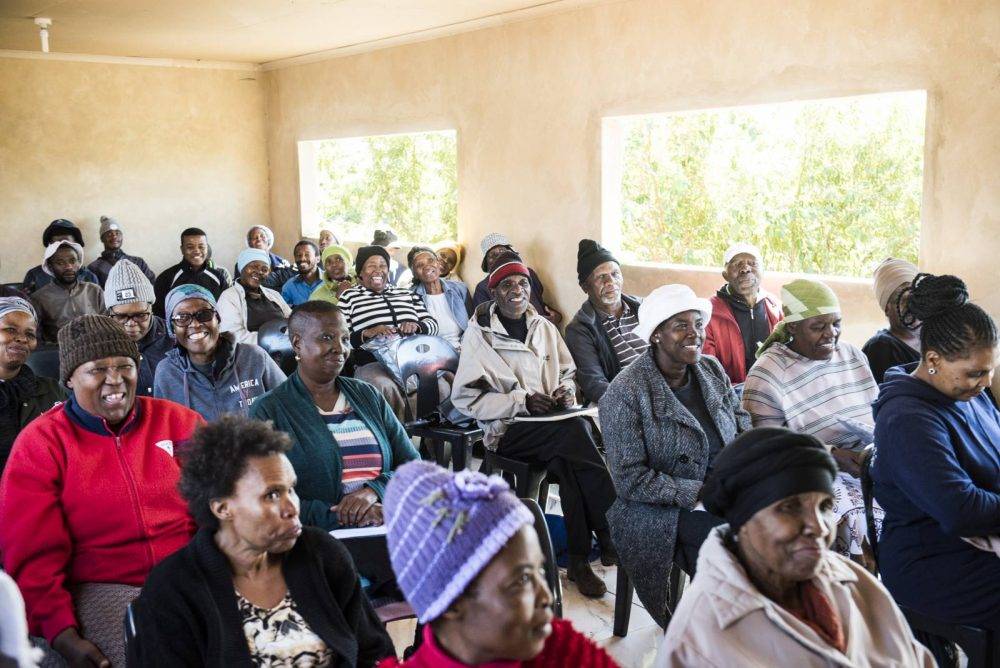Tim Nectar Farms is an accredited training academy headed up by agroecologist Tim Abaa. (Delwyn Verasamy/M&G)
Tucked between the sea of shacks and government subsidised RDP homes that comprise Orange Farm township, not far from the Golden Highway, is a magical space of vegetation, animals and people of all ages. This is Tim Nectar Farms, an accredited training academy headed up by agroecologist Tim Abaa.
There are no signboards; Google Maps will deliver you to the vicinity of the entrance, but you won’t find it unless you ask a resident. There’s no security although, behind the modest entrance, the property is crammed with equipment. This is because Abaa has achieved what he deems most vital: the trust of the people. They see him as a valuable asset.
It didn’t happen overnight. Abaa has spent the past 15 years promoting urban farming in Orange Farm. The biggest lesson he has learned is patience. “A farmer has to be patient: you have to get land, prepare the soil, plant seeds, water, weed, wait for harvest, then hope that there is a market for what you produce,” he says.
“The same thing applies to the members of the community — you have to be patient with them until they buy into what you stand for. You have to understand them; they think in terms of ‘what is in this for me, and for us?’ But when they begin to see youngsters who are becoming the best agripreneurs, food in abundance and climate change being addressed, then they see an asset.”
His passion is derived from Egerton University in Nairobi, where he says the practice of urban farming is “huge,” and he passes on his knowledge in training and educational workshops across South Africa. Mostly, he shares his agroecology and agripreneurship training at Orange Farm, at his micro urban farm, and at a three-hectare organic farm in Orange Farm South, which has more than 350 kinds of vegetables, herbs and fruit growing on it.
Marigold, which is a natural pesticide, is growing among the food plants and herbs. Abaa says the idea behind agroecology is to study Mother Nature and then try to mimic her. “With the adoption of industrial farming, we lost our natural farming practices. The key is soil health; once the soil is healthy, so are the plants, animals, the community and the entire ecosystem.” He promotes farming methods that integrate science and innovation.
Abaa’s philosophy is about minimum space, maximum production and doing it yourself.
 There’s more than 350 different kinds of plants at the facility. (Delwyn Verasamy/M&G)
There’s more than 350 different kinds of plants at the facility. (Delwyn Verasamy/M&G)
Get youth involved
The focus of his training is on people liberating themselves through creating a garden. Abaa calls this G2K: from garden to knowledge. Although he teaches “everyone from age three to 100”, his mission is to create an interest in farming among the youth, a desire to become self-sufficient farmers — and this is starting to happen. “I’m making farming sexy, in a modern way,” he says with a grin.
The training academy is divided into three programmes: GTK (for people aged three to 18); agripreneurship (18 years to 40 years); and community gardeners (40 years and more).
Abaa wants the youth to become “agri-entrepreneurs”, because to be a farmer is to be a business person. This entails instilling business ethics and skills such as saving, finance, leadership and problem-solving. “If you have an idea such as making juice from spinach, you don’t just have to make it, you have to work out how to market it, who you are targeting, what value you are adding and who will do what in the process of production.”
He says the way to keep the youth involved in learning how to grow food is by inspiring them, so he has to be a role model for them. They enjoy exposure to new things, so field trips and agri-tours are effective. They have to believe in the project to stay motivated, and once they have done the training and start growing food, they usually become excited. It also helps if they get a stipend.
His food garden has also become somewhat of a haven. “Young nyaope junkies come here for herbs and for healing,” says Abaa. There is even a sign in the garden that reads: “Welcome to garden therapy.” Several youths milled about examining the seed bank jars of heirloom seeds, the variety of plants, the animals and the composting zones. Some were just hanging out and enjoying nature.
Abaa also trains pensioners. Many of them have told him that half of their income now comes from selling the fresh produce they grew and that they have saved 50% on their monthly grocery bills.
“We are encouraging them by giving them seeds, seedlings, compost, gardening tools, free training and telling them to help their neighbours to start making their own food gardens. This is helping to build social cohesion. Growing food and sitting down to eat it together unites people.”
Abaa has trained seven staff members and together they pass on skills such as how and when to water, how to create the best soil for growing food, and how to use food waste for composting. They share information about planting seasons, how climate change is affecting farming and how to address it. Children learn which parts of plants are edible, from roots to flowers, the value of growing their own fresh vegetables, herbs and flowers and the benefits of eating healthy food.
 Tim Abaa’s mission is to create an interest in farming among the youth, a desire to become self-sufficient farmers — and this is starting to happen. (Delwyn Verasamy/M&G)
Tim Abaa’s mission is to create an interest in farming among the youth, a desire to become self-sufficient farmers — and this is starting to happen. (Delwyn Verasamy/M&G)
None but ourselves
Asked what has been his biggest obstacle, Abaa replies: “Zero funding: nothing from the government, the private sector or from individuals.” This is surprising because he’s been in the media (including CNN) multiple times. Dozens of students from Italy, the Netherlands and the United States have come to record his training methods as part of their postgraduate degrees and research.
In 2019, he won the best corporate social investment project of the year from the Lewis Foundation for installing a sustainable food garden and conducting two weeks of permaculture training for the University of Johannesburg’s Process, Energy and Environmental Technology Station and Schneider Electric at Isiboniso Primary School. It’s not like he’s not on the map.
Everything that Abaa has created at Orange Farm has come from his own pocket. He bought the land he lives on where he has a food garden, which was filled with thousands of rocks that had to be moved. The larger plot in Orange Farm South was obtained through an agreement with the City of Johannesburg.
To raise funds, he runs training courses across South Africa, and his crew sells the fresh produce they grow to locals, restaurants in Joburg and to NGOs that run feeding schemes, although some vegetables are donated to the needy. The crew recently bought weed-eaters to earn money by cutting grass and offering garden services in the townships.
Using this money, they have built two training centres that can accommodate 350 learners: one at his home and one near the farm. “This is where the kitchen will be, here’s the computer lab, this classroom looks out over this great view …” Some of the classrooms are already filled with students.
“Stop waiting for the government to help you,” says Abaa. He’s dealt with the problem of load-shedding by purchasing generators, and that of water shortages by investing in water tanks. The water from the tanks is used in the urban farm, and residents also help themselves when their taps run dry. His long-term dream is to buy solar panels.
Abaa is in the process of installing a biogas plant in Orange Farm, which will use all forms of waste, of which there is an abundance. “A lot of waste is generated in making fast food like kotas and chips, but waste is not valued; it is often dumped in the townships. Biogas can be used to generate electricity, to supplement the unreliable City Power.”
The biogas plant should be completed in the next three months or so. Its byproducts will be used for making compost, liquid fertilisers and bio-pesticides. Abaa intends to use the plant for training purposes, to show people the value of their waste and environmental care.
He is also planning to plant 300 fruit trees before June this year and create a food forest, and add more beehives.
 The new training centre at Tim Nectar Farms. (Delwyn Verasamy/M&G)
The new training centre at Tim Nectar Farms. (Delwyn Verasamy/M&G)
Growing health
Loyal to his slogan “Mabadle abantu” or “Let people eat, he believes people should not only eat healthy food but also in the process of food production gain knowledge and expertise, thereby creating a holistic food sovereign society.
“People must claim their space in the food production value chain, not just be passive consumers. You don’t know what you’re getting when you buy food from shops.”
Abaa wants people to start their own urban farms in their backyards and sell their produce at micro-stalls to reduce the distance between where food is produced, sold and consumed.
He says organic food should not be only affordable for the wealthy. But is often not valued in the townships because many people do not realise its value and health benefits. “It is important for the heads of households to realise its importance and pass this on, so the youngsters stop eating junk food and follow their example.”
 Pensioners receive training at Tim Nectar Farms. (Delwyn Verasamy/M&G)
Pensioners receive training at Tim Nectar Farms. (Delwyn Verasamy/M&G)
Of his urban garden Abaa says: “We are not growing food here, we are growing health.”
To be a farmer is to provide a service that can be trusted. “We subscribe to ‘PGS’, the participatory guarantee system, which assures consumers that the food they eat from us is organic, can be trusted, and is not only chemical-free but also healthy. Anyone can come and see how we make our products, grow our food and create our compost.”
And where does the name Tim Nectar Farms come from? “I’m a beekeeper,” Abaa says. “But it’s also because nectar is sweet, like our alternative food system that we are busy creating. If someone can choose their own path, and make their own farm — that is nectar for me.”
This is the second story in a series on urban farming. Read the first here.